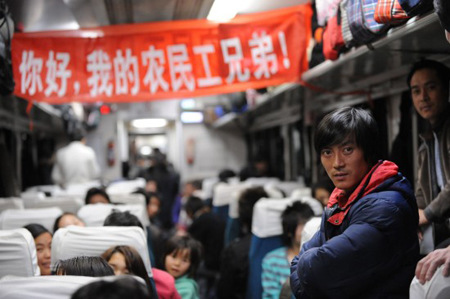(Ecns.cn)--After dropping out of school at a very early age, 23-year-old Liu Jinzhou left his home in a small village in east China's Jiangsu Province and migrated to work in Yangzhou, a famous historical city in Jiangsu, where he has now been for over eight years.
Without asking permission from his family, Liu discontinued his high school studies at the age of 16. Though angered by Liu's decision, his father did not stop him from leaving the village and earning a living in Yangzhou.
"The first time I landed in Yangzhou, I was mesmerized and lost in this fancy city. With only a little money in my pocket, I didn't know where to go and what to do," recalled Liu. Luckily, he soon got a job at a local supermarket, which provided him with meals and a bed.
But because the job only paid a monthly salary of 500 to 600 yuan ($78.86 to $94.63), Liu left a few weeks later. "At that time, I often thought that I could find a better job," he said.
Over time, Liu found many other jobs, but few provided much stability.
After a restive year, Liu went to his father, who worked at a shipyard in Yangzhou, for help. Liu's father had worked in the shipyard for over 10 years, so without much effort he found a job for his son there.
Now Liu earns over 3,000 yuan ($473.18) a month, but the job is risky. "In shipyards, half of your life is already under the control of Death. There are people injured here every day," said Liu, who was once knocked out by a falling mast.
"I think I will continue to work here, though, because the salary can help support my wife and child," he said.
Many people migrate from villages and small towns in China to seek better lives in cities, but not all of them are as lucky as Liu.
"I thought if I tried very hard, one day I would be successful," said Liu Haiting, who comes from the same village and is also now a migrant worker in Yangzhou, "but after all these years I have earned nothing, and I can't go back to my hometown like this."
Haiting came to Yangzhou after graduating from high school. Since moving there his urban dreams have been gradually destroyed over the past few years, as his life and work have both been constantly unstable. One of the main problems is the attitude of the locals.
"The Yangzhou dialect is hard to understand, and local people always discriminate against outsiders who speak other dialects," he said.
Because of this, Haiting lives in fear of humiliation. For Liu Jinzhou, this is also a problem. "No matter what you wear, when the local people find out that you are a villager, they will look down on you," he said.
Although he has worked in Yangzhou for eight years, Liu Jinzhou seldom leaves the shipyard after work. Migrant workers like him and Liu Haiting often try to minimize the possibility of contact with local people.
"Unlike their fathers' generation, which often left home just to work for money, new-generation migrant workers like Liu Jinzhou also want respect," said Wang Chunguang, an analyst with the Chinese Academy of Social Sciences.
According to Wang's research, only 18.2 percent of the new generation of migrant workers go to work in cities purely for money. They are also motivated by the lifestyle and hope to build themselves up socially.
Yet most migrant workers have sacrificed their youth in cities. Aside from a few who have realized their dreams, most are left in awkward situations and unable to return to their hometowns.
"Farming is already unfamiliar to me," said Liu Jinzhou, who has become accustomed to modern technology such as mobile phones and computers. The mindsets of such people have also been altered by their urban experiences, further alienating them from the villagers in their hometowns.
"It is more comfortable to talk and hang out with people who also work in cities," said Liu Jian, who is now working in Beijing. "We can only talk about farming with villagers."


















